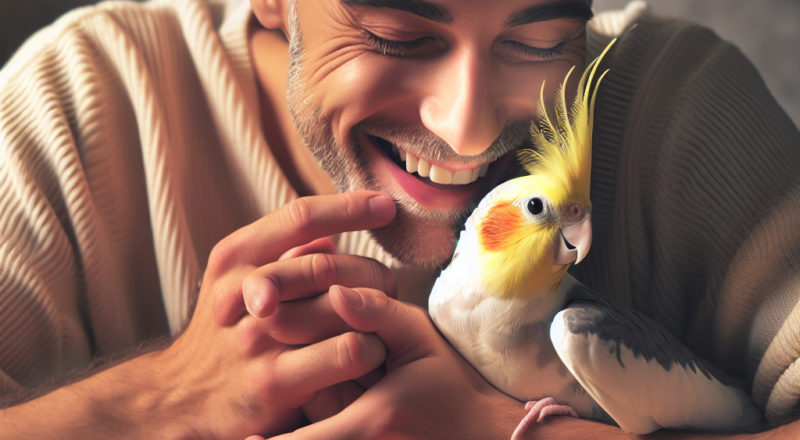Cockatiels are delightful and charismatic birds that have been winning the hearts of bird enthusiasts worldwide. Known for their charming whistles and affectionate nature, these birds are a great choice for both novice and experienced bird owners. In this comprehensive guide, we will explore the essential aspects of owning a cockatiel, including their behavior, social needs, dietary requirements, and more.
Understanding Your Cockatiel’s Personality
Cockatiels are highly social and love interaction, which makes them excellent companions. They thrive in environments where they receive plenty of attention and can become quite attached to their human caregivers. These birds are intelligent and can be taught various tricks, as well as repeat whistles and simple phrases.
Behavior and Social Interaction
In a flock, cockatiels communicate using a variety of calls and whistles. When kept alone, they often seek attention from their human companions, displaying affectionate behaviors such as head tilting and gentle nibbles. Cockatiels are generally gentle with children, making them an ideal pet for families. However, young children should always be supervised around these delicate creatures to ensure their safety and well-being.
Cockatiel Care and Well-being
Proper care is crucial for maintaining the health and happiness of your cockatiel. Start by providing a spacious cage equipped with perches, toys, and foraging opportunities. Regular social interaction outside the cage is important for their mental stimulation.
Dietary Needs for Optimal Health
Cockatiels require a balanced diet that includes fortified pellets, fresh fruits, vegetables, and seeds. It’s essential to maintain a varied diet to prevent nutritional deficiencies. While seeds are a favorite, they should not be the sole component of the diet. Regular monitoring of food intake and body condition can help avoid obesity and other health issues.
Veterinary Care and Routine Health Checks
Routine veterinary care is important to ensure your cockatiel’s health. Regular check-ups can help detect issues early, such as respiratory infections or feather problems. It’s also important to maintain an appropriate vaccination schedule as advised by your veterinarian.
Training Your Cockatiel
Training a cockatiel can be a rewarding experience. Positive reinforcement, such as treats and praise, is effective in teaching tricks and commands. Start with simple commands and gradually progress to more complex ones as your bird gains confidence.
Costs Associated with Cockatiel Care
The cost of caring for a cockatiel includes the initial setup of a cage and supplies, ongoing food and toy expenses, and veterinary care. Budgeting for these aspects is important to ensure you can provide the best care for your bird.
Adopting a Cockatiel
Adopting a cockatiel from a rescue or shelter can be a fulfilling experience. Not only does it provide a home for a bird in need, but it also offers you the opportunity to support animal welfare. Be sure to inquire about the bird’s history and health before adopting.
Legal Considerations
It’s important to be aware of local regulations and laws regarding bird ownership. Some areas have specific guidelines on keeping pet birds, especially regarding noise concerns and housing.
Saiba mais
If you’re looking to enhance your bird care skills, explore our resources for more tips and information. Whether you’re a beginner or an experienced bird owner, there’s always something new to learn in providing the best care for your feathered friends.
- Ensure your cockatiel’s cage is large enough for free movement.
- Provide a variety of toys to prevent boredom.
- Engage in daily interaction and playtime.
- Include fresh fruits and vegetables in their diet.
- Conduct regular health checks and veterinary visits.
- Keep water fresh and available at all times.
- Avoid placing the cage in drafty areas or direct sunlight.
- Monitor for any changes in behavior or appetite.
- Offer a balanced diet with fortified pellets.
- Train with patience using positive reinforcement.
- Rotate toys frequently to maintain interest.
- Register your bird with a local vet upon adoption.
- Beware of household hazards such as open water and toxic plants.
- Consider adopting rather than buying to support animal welfare.
- Invest in a bird-safe harness for outdoor exploration.
- Learn about your area’s legal requirements for pet birds.
- Keep noise levels moderate to not stress your bird.
- Introduce new foods slowly to prevent digestive issues.
- Practise proper hygiene and cleanliness in the cage.
- Explore bird care forums and communities for support.
Discover the secrets to a healthy and balanced diet for your dog with over 40 delicious and healthy recipes
Explore this valuable resource and learn how to provide your pet with the best nutrition possible.
Click the image below to learn more about the product:
Cockatiels, with their striking crests and cheerful whistles, are among the most adored pet birds in the world. Originating from Australia, these small parrots are known for their friendly disposition and engaging personalities. This guide aims to explore all aspects of cockatiel care, ensuring that you are well-prepared to welcome one of these charming birds into your life.
The History of Cockatiels
Cockatiels were first discovered in the 18th century and were later introduced to Europe in the early 1900s. Native to the arid regions of Australia, they have adapted well to various environments, bringing joy to bird enthusiasts globally. Over the years, selective breeding has led to numerous color mutations, making them a popular choice for pet lovers.
Table of Cockatiel Highlights by Country
| Country | Popularity Rank | Common Varieties |
|---|---|---|
| USA | 1 | Normal Grey, Lutino, Pied |
| Australia | 2 | Normal Grey, Cinnamon |
| Canada | 3 | Whiteface, Pearl |
| UK | 4 | Lutino, Cinnamon |
| Germany | 5 | Pearl, Spangle |
Choosing the Right Pet
Before adopting a cockatiel, consider your lifestyle and environment. Cockatiels thrive in social settings and require interaction, so they are ideal for individuals or families who can spend time engaging with them. An active household may complement a cockatiel’s playful nature, while quieter homes may require additional patience to nurture their social needs.
The Importance of Adoption
Choosing to adopt a cockatiel rather than buying one from a breeder can save a life and contribute to responsible pet ownership. Research local bird rescues or shelters, and understand the adoption process, which may include interviews and home checks.
First Steps Upon Bringing Your Cockatiel Home
Prepare your home for your new pet by setting up a safe, spacious cage, and provide toys and perches for stimulation. Ensure the area is quiet for the first few days to help your cockatiel acclimate to its new environment.
Proper Nutrition
Cockatiels require a balanced diet consisting of pellets, seeds, fresh fruits, and vegetables. Ensure you provide the right amounts at regular intervals to meet their nutritional needs. Offer a varied diet to prevent boredom and health issues.
Water and Hydration
Always provide fresh, clean water. Cockatiels may be prone to dehydration, so it is crucial to ensure they have continuous access to water.
Vaccination and Deworming
Consult with a veterinarian about vaccination schedules and the necessity of regular deworming. Keeping up with these health measures ensures your cockatiel remains healthy and protected against common diseases.
Regular Veterinary Check-Ups
Annual or biannual veterinary visits are crucial to monitor your cockatiel’s health, allowing for early detection of any potential issues.
Hygiene Practices
Maintain your cockatiel’s hygiene by offering bath opportunities, cleaning their cage, and monitoring their nails, beak, and feathers to ensure they are in good condition.
Physical Exercise
Encourage daily exercise through flight time and interactive play. This activity is essential for their physical health and mental stimulation.
Toys and Environmental Enrichment
Provide a variety of toys, as they help prevent boredom and encourage natural behaviors. Rotate toys regularly to maintain interest.
Socialization
Expose your cockatiel to various people, environments, and other pets to promote healthy social behavior.
Basic Training
Teach basic commands and tricks to facilitate good behavior and enhance your bond. Training can also be a fun way to keep your cockatiel engaged.
Addressing Unwanted Behaviors
Identify and manage undesirable behaviors such as loud calling or feather plucking. Understanding the cause of these behaviors can help remedy them.
Identification
Ensure your cockatiel has proper identification, such as a collar with a tag or a microchip, to prevent them from getting lost.
Safety Precautions
Make your home safe for your cockatiel, removing hazards and ensuring secure environments during outings.
Legal Considerations
Familiarize yourself with local laws regarding pet ownership, welfare, and breeding regulations for responsible ownership.
Financial Responsibilities
Prepare a budget for your cockatiel’s care, including food, veterinary checks, and supplies to ensure you can provide for their needs.
The Emotional Impact of Pet Ownership
Cockatiels can significantly improve your emotional well-being, offering companionship, joy, and reducing stress.
Caring for Aging Cockatiels
Older cockatiels need special attention, including possibly changing their diet and monitoring for age-related health issues.
Dealing with Grief
In the unfortunate event of losing your feathered friend, allow yourself to grieve. Sharing memories and seeking support from communities can help in the healing process.
For those determined to enhance their pet’s behavior and strengthen their bond, consider our special program:
Transform Your Dog’s Behavior in Just Days!
Click the image below to discover the product:



/hotmart/checkout_custom/10424f92-b07f-4561-bff4-bf470c0e4846/6t29rz3e.jpg)